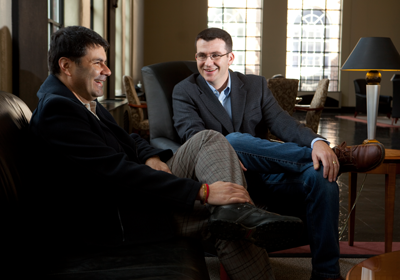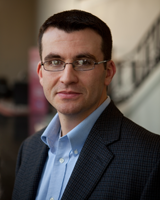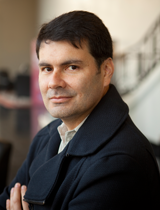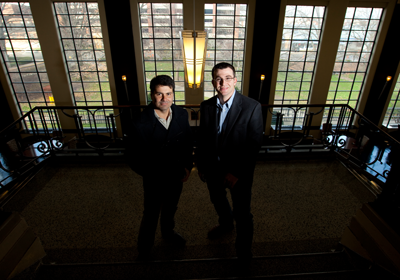Jarrod Brown and Iván Sánchez-Medina
Ph.D. Students
by Leah Bayens
photos by Mark Cornelison
Any language devotee knows that linguistics illuminates socio-political and bio-cultural mysteries. Apparently, it also forms the tie that binds a former theologian and a former telecommunications specialist, bringing both into the Hispanic Studies fold.

Doctoral candidates Jarrod Brown and Iván Sánchez-Medina diverged from many years of study and service in religion and business communications, respectively, and found a home in UK’s Department of Hispanic Studies precisely because of the program’s renewed emphasis on linguistic research. Despite their disparate backgrounds, and in spite of different research areas, they both use linguistics to track the continuum of presences and absences in language.
The violence produced by the Guatemalan Civil War deeply affected Brown both personally and professionally. Having completed two medical missions working as an interpreter there, Brown was intimately aware of the absences that resulted from murder, disappearances, and torture during a war that began in 1960 and ostensibly ended with the Peace Accord of 1996.
As a scholar, he initially approached power and violence in Latin America by studying liberation theology, which confronts social, political and economic injustices as well as the ideological roots of oppression. For a recipient of a Masters in Theological Studies from Duke University as well as a Masters in Moral Theology from the University of Notre Dame, this tactic perhaps comes as no surprise.

Since his days as a Centre College undergraduate studying Spanish and religion, this Nicholasville, Ky., native has held a long-standing fascination with the intricacies of power relations. Drawing on the work of philosopher Michel Foucault, Brown believes that power doesn’t spread through a top-down model, and it is hardly ever centrally located.
With this in mind, Brown was keen to look at how Guatemalan citizens resisted authority and how they, as well as their government, narrated the intense violence in that country. He has since discovered that narratives published during and after the war are essential to understanding Guatemalans’ responses to broad-reaching, state-generated terror.
This realization played a part in convincing Brown to switch academic paths from theology to Hispanic Studies. Now he is working on a dissertation project that will use testimonios, fiction, government documents and even dramatic street performances to trace the “tentacularization of power,” that is, the ways power penetrates society. In his project, Brown plans to focus on three major literary moments that narrate violence and terror: testimonios, the new novel and post-Accord literature.
Brown explained that each moment seems to address the ‘striptease of power,’” as William Cavanaugh called it, in which the “state reveals one aspect of its agency as it’s hiding another.” He noted that testimonios feel like documentaries, “so the language pretends to be transparent.”
On the other hand, the new novels produced during the war may have experimented so heavily in allegories, symbols, and multi-vocality that power structures might have been “skewed in a way that may or may not be helpful in narrating the violence.” He suspects that post-Accord texts, instead of either representing or rhetoricizing violence, play with presences and absences in a way that masks violence, thereby presenting a new approach to “narrating, exposing and perhaps challenging the ‘striptease of power.’”
Regardless of stylistic variations, each narrative movement draws on different ways of referencing ‘reality’ so that gaps and silences are produced even as writers narrate aggression. Using sociolinguistics, Brown inquires into how a subject can talk, creating a presence, yet continue to produce gaps simultaneously. He believes he may have located in these voids unique approaches to confronting oppressive tactics that infiltrate every level of Guatemalan social life.

Sánchez-Medina is also interested in permeations of power through discourse, but his work will focus more exclusively on tracing presences. The dissertation project he has in mind will use sociolinguistics to identify how Latin American groups have left their marks on Spanish peninsular language. This will be a kind of reverse transatlantic project, one that considers the other side of colonial influence and defies the notion that peninsular Spanish (and Spanish culture with it) has played an exclusively dominating role.
By looking at vocabulary and expressions in twentieth and twenty-first century novels, movies, and other popular sources, Sánchez-Medina believes he can demonstrate the significant impact Latin American Spanish has had on Iberian Spanish. Ecuadorians and his fellow Colombians constitute the largest group of immigrants to Spain, so Sánchez-Medina will most likely investigate their texts. He’ll be looking for “variations in the language” in vocabulary and in colloquial expressions.
The issue of language influence first piqued Sánchez-Medina’s interest when he moved from his home in the Colombian countryside near Popayán to Bogotá. After earning a communications engineering degree from the Universidad del Cauca, and after teaching courses there for six years after graduation, Sánchez-Medina moved to the country’s capital to begin working for a U.S. company, where he specialized in business communications.
In Bogotá, he was struck by the colloquial differences in vocabulary between regions only 350 miles apart: “I can see that our language in my hometown is different from the language in Bogotá or other big cities because our Spanish has had influences from the native language. This was a big motivation for me to understand how this vocabulary bled into the language.”
So when Sánchez-Medina enrolled in UK’s English as a Second Language program, he already had in mind a linguistics-oriented project. When he gained admission to the Hispanic Studies Program, he adopted the Allied Field in Hispanic Linguistics as a supplemental course of study. “I came thinking about linguistics, because I liked so much the evolution of the language,” he commented. And in the long run, Sánchez-Medina’s research bodes to make a vital contribution to understanding the flip side of colonization through linguistic change.

Using linguistics to investigate the range of presences and absences is precisely the kind of work Brown’s and Sánchez-Medina’s mentors encourage them to take up. The experienced and knowledgeable faculty members, Brown remarked, “have constantly challenged me to explore more fully my theoretical framework, to investigate more thoroughly the socio-political contexts, and to always consider new ways of approaching a text.” Sánchez-Medina, too, commended the Hispanic Studies faculty and his colleagues for presenting different perspectives and for appreciating people like himself who “have a different background and look at the literature with other eyes.”
Sánchez-Medina and Brown have covered vast geographic, academic, and professional ground. Their forays into linguistic terrain promise to be equally engaging and significant.
